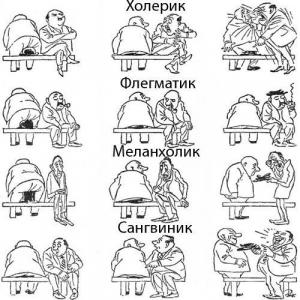Character traits spelled out. The most significant characteristic features of a person's personality
By studying the characteristics of the character of a particular person, it is possible to identify what qualities characterize a person. At the heart of their manifestation are the influence of individual experience, knowledge, abilities and capabilities of people. The list of biological features includes the innate characteristics of a person. Other personality traits acquired as a result of life:
- sociality
It means irreducibility to individual, biological characteristics of people, saturation with socio-cultural content.
- Uniqueness
The uniqueness and originality of the inner world of an individual, his independence and the inability to attribute to one or another social or psychological type.
- transcendence
Willingness to go beyond one's "limits", constant self-improvement as a way of being, belief in the possibility of development and overcoming external and internal obstacles on the way to one's goal and, as a result, incompleteness, inconsistency and problematicness.
- Integrity and subjectivity
Internal unity and identity (equality to oneself) in any life situations.
- Activity and subjectivity
The ability to change oneself and the conditions of one's existence, independence from the surrounding conditions, the ability to be a source of one's own activity, the cause of actions and the recognition of responsibility for the actions performed.
- Moral
The basis of interaction with the outside world, the willingness to treat other people as the highest value, equivalent to one's own, and not as a means to achieve goals.
List of qualities
The personality structure includes temperament, volitional qualities, abilities, character, emotions, social attitudes and motivation. And also separately the following qualities:
- Independence;
- Intellectual self-improvement;
- Communication;
- Kindness;
- industriousness;
- Honesty;
- Purposefulness;
- A responsibility;
- Respect;
- Confidence;
- Discipline;
- Humanity;
- Mercy;
- Curiosity;
- Objectivity.
The personal qualities of a person are internal perception and external manifestations. External manifestation includes a list of indicators:
- congenital or acquired artistry;
- attractive appearance and sense of style;
- ability and distinct pronunciation of speech;
- intelligent and sophisticated approach to .
The main qualities of a person (her inner world) can be classified according to a number of criteria:
- a comprehensive assessment of the situation and the absence of conflicting perceptions of information;
- inherent love for people;
- unbiased thinking;
- positive form of perception;
- wise judgment.
The level of these indicators determines the individual characteristics of the student.
The structure of individual qualities
To more accurately determine the quality of a person's personality, it is necessary to highlight its biological structure. It consists of 4 levels:
- Temperament, including characteristics of genetic predisposition (nervous system).
- The degree of unique mental processes that allows you to determine the personal qualities of a person. The level of individual perception, imagination, manifestation of volitional signs, feelings and attention affects the result.
- The experience of people, characterized by knowledge, abilities, capabilities and habits.
- Indicators of social orientation, including the attitude of the subject to the external environment. The development of personal qualities acts as a guiding and regulating factor in behavior - interests and attitudes, beliefs and attitudes (a state of consciousness based on previous experience, a regulatory attitude and), moral norms.
Features of people that characterize their temperament

The innate qualities of a person form him as a social being. Behavioral factors, type of activity and social circle are taken into account. The category is shared by 4 concepts: sanguine, melancholic, choleric and phlegmatic.
- Sanguine - easily adapting to a new habitat and overcoming obstacles. Sociability, responsiveness, openness, cheerfulness and leadership are the main personality traits.
- Melancholic - weak and inactive. Under the influence of strong stimuli, behavioral disturbances occur, manifested by a passive attitude to any activity. Closure, pessimism, anxiety, a tendency to reason and touchiness are characteristic features of melancholic people.
- Cholerics are strong, unbalanced, energetic personality traits. They are short-tempered and unrestrained. Resentment, impulsiveness, emotionality and instability are clear indicators of a restless temperament.
- Phlegmatic - a balanced, inert and slow personality, not inclined to change. Personal indicators act in easy overcoming of negative factors. Reliability, goodwill, peacefulness and prudence are the hallmarks of calm people.
Individual character traits
 Character is a set of individual traits that are manifested in different types of activities, communication and relationships with people. The development of personal qualities is formed against the background of life processes and the type of activity of people. For a more accurate assessment of the nature of people, behavioral factors in specific circumstances should be studied in detail.
Character is a set of individual traits that are manifested in different types of activities, communication and relationships with people. The development of personal qualities is formed against the background of life processes and the type of activity of people. For a more accurate assessment of the nature of people, behavioral factors in specific circumstances should be studied in detail.
Varieties of character:
- cycloid - changeability of mood;
- hyperthymic accentuation consists in high activity, failure to complete things;
- asthenic - capricious and depressive personal qualities;
- sensitive - timid personality;
- hysterical - the makings of leadership and vanity;
- distimic - focused on the negative side of current events.
Individual abilities of people
Individual psychological qualities of a person contribute to the achievement of success and perfection in a certain activity. They are determined by the social and historical practice of the individual, the results of the interactions of biological and mental indicators.
There are different skill levels:
- giftedness;
- talent;
- genius.
The development of the algorithm of personal qualities and abilities of people is characterized by the ability to learn new things in the mental sphere. Special features are manifested in a specific type of activity (musical, artistic, pedagogical, etc.).
Volitional traits of people
Adjustment of behavioral factors associated with overcoming internal and external discomfort makes it possible to determine personal qualities: the level of efforts and plans for taking actions, concentration in a given direction. Will manifests itself in the following properties:
- - the level of effort to achieve the desired result;
- perseverance - the ability to mobilize to overcome troubles;
- endurance is the ability to limit feelings, thoughts and actions.
Courage, self-control, commitment are the personal qualities of strong-willed people. They are classified into simple and complex acts. In a simple case, urges to action flow into its execution automatically. Complex acts are carried out on the basis of drawing up a plan and taking into account the consequences.
human feelings
 The persistent attitude of people to real or imaginary objects arise and are formed on the basis of the cultural and historical level. Only the ways of their manifestation, based on historical epochs, change. are individual.
The persistent attitude of people to real or imaginary objects arise and are formed on the basis of the cultural and historical level. Only the ways of their manifestation, based on historical epochs, change. are individual.
Personality motivations
Motives and motivations that contribute to the activation of actions are formed from. The stimulating qualities of a person are conscious and unconscious.
They appear as:
- striving for success;
- avoiding trouble;
- getting power, etc.
How to manifest and how to recognize personality traits
The personal qualities of an individual are determined by analyzing behavioral factors:
- self-esteem. manifested in relation to themselves: modest or confident, arrogant and self-critical, decisive and brave, people with a high level of self-control or lack of will;
- assessment of the relationship of the individual to society. There are different degrees of relationships between the subject and representatives of society: honest and fair, sociable and polite, tactful, rude, etc.;
- a unique personality is determined by the level of interests in the labor, educational, sports or creative field;
- clarification of the position of the individual in society occurs in a close relationship of opinion about it;
- in the study of psychological factors, special attention is paid to memory, thinking and attention, characterizing the development of personal qualities;
- observation of the emotional perception of situations allows you to assess the reaction of the individual when solving problems or its absence;
- measuring the level of responsibility. The main qualities of a serious personality are manifested in labor activity in the form of a creative approach, enterprise, initiative and bringing things to the desired result.
A review of the individual properties of people helps to create a general picture of behavior in the professional and social sphere. Under the concept of "personality" is a person with individual properties, due to the social environment. These include personality traits: intelligence, emotions and will.
Grouping features that contribute to personality recognition:
- subjects who are aware of the presence of their inherent social traits;
- people participating in the social and cultural life of society;
- personal qualities and character of a person are easy to determine in a social relationship through communication and the labor sphere;
- individuals who are clearly aware of their peculiarity and significance in the public.
Personal and professional qualities of a person are manifested in the formation of a worldview and internal perception. The individual always asks philosophical questions about life, his significance in society. He has his own ideas, views and life positions that influence
For those who do not like their own "psychological portrait", there is consolation: the shortcomings of temperament can be made up for by positive character traits.
It is the understanding that one can change oneself for the better that is the most attractive feature as a science.
So, if temperament is an innate personality trait, then a person educates the character himself. When we perform an act, each time we strengthen or weaken some of its traits.
In this way, even the most bad temper can be corrected.
Regarding temperament, we can only recall that Hippocrates divided it into four types that are still used today:
- Phlegmatic - unhurried and unperturbed;
- Cholerics - quick-tempered and unbalanced;
- Melancholic - impressionable and vulnerable;
- Sanguine people are lively, mobile and cheerful.
Fixing the results
It is better to write down the results of your struggle. You can make a table, and record successes and failures there every day. Or do this: mark two cities on a geographical map. One will conditionally denote your current state, the second - the goal.
Every time you do something to improve your character, put a new point on the path between these cities. And if you miss something, go back a point.

In terms of very interesting it seems. Be sure to read about this great man, whose experience can be of invaluable help to you.
Surely the reader may have a question: do they influence the formation of personality and its individual features?
It is rather difficult to give an unequivocal answer to this question. A certain connection in the inclinations and characteristics of behavior between children and parents, of course, can be traced.
However, to claim that “I am like this and I can’t be different, because this is my mom or dad”, for an adult, at least not seriously.
It is believed that it is impossible to change the temperament, but character traits are within the power of anyone who wishes. You just need to be determined to do it.
character accentuation
Character accentuation is a character trait that is within the clinical norm, in which some of its traits are excessively enhanced, as a result of which selective vulnerability is found in relation to some psychogenic influences while maintaining good resistance to others.
You may find the definition of accentuation a bit complicated, but it's actually quite simple.
The very word "accentuation" (from Latin accentus - stress) means a pronounced emphasis on something.
In other words, this feature lies in the fact that some character traits are unusually developed, which causes the inferiority of other, less developed traits.


Probably everyone saw how small children, at the sight of strangers, settle down to one and begin to smile, and at the sight of others they frown and run away.
This is due to the fact that facial features are very closely related to our character traits. Children intuitively feel this, "scanning" the face of a stranger.
Yes, and adults at a deeply subconscious level can “feel” a good or bad person in front of them. This also happens because our brain is able to "read" information from the characteristic features of a person's face.
It is important to understand that the character of a person largely determines how his life will turn out, whether he will succeed.
The 19th-century English writer William Thackeray wrote:
"Sow an act and you reap a habit; sow a habit and you reap a character; sow a character and you reap a destiny."
If you like interesting facts - subscribe to any social network. It's always interesting with us!
Liked the post? Press any button.
The view of a person as a collection of negative symptoms is widely used in "classical" psychology and psychiatry with its DSM-V.
In positive psychology, they tried to look at the strengths of a person.
After five years of work by 50 leading experts in psychology, anthropology, sociology, cultural studies and other human sciences, a classifier of positive character traits appeared ( character strengths) K. Peterson and M. Seligman.
It includes 24 positive traits, initially grouped into six categories ( virtues): wisdom and knowledge, courage, humanity, sociality, moderation and spirituality.
However, there are now a number of studies that suggest combining these traits into three or four blocks.
- carry a positive moral assessment, regardless of the potential or real benefit;
- stable over time;
- positively influence other people when one uses such traits;
- are in the focus of institutions (school, church, etc.).
Positive character traits can also be defined as innate qualities that occur naturally, feel authentic, and are used through a person's intrinsic motivation.
It is important to understand that everyone has these traits, they can be developed with the help of special exercises, and they must be used wisely.
We have already written about how you can determine your own without special diagnostics.
Here is a list of such traits:
| Creativity | Creativity, originality, ingenuity | The ability to generate fundamentally new ideas that positively affect the life of a person or others. Ideas can relate to everyday life, and fundamental scientific works, discoveries, inventions, art, etc. Creative people use their imagination to solve problems they face. |
| Curiosity | Curiosity, interest, novelty-seeking, openness to experience | Interest in what is happening, the desire to get answers to the questions that an event causes. Curiosity is expressed in the identification and use of opportunities for obtaining new knowledge and skills, as well as openness to new experience. |
| Flexibility of thinking | Open-mindedness, judgment, critical thinking | The desire to find several different options for solving the problem, attentiveness to alternatives. It manifests itself in the ability to explore all aspects of the situation, to find arguments for and against, to hear the opposite point of view. |
| Interest in learning | love of learning | The desire to expand erudition and acquire new knowledge, skills, explore new places. This feature is manifested in the ability to "immerse" in new material, to continue learning even when something does not work out. |
| Wisdom | Perspective, wisdom | Attention to the broader context of ongoing events, understanding of general patterns, the ability to ask important and complex questions regarding morality and life meaning, to give valuable advice to others. People with a developed trait know their strengths and weaknesses, and also strive to contribute to society. |
| Bravery | Bravery, valor | The ability to maintain perseverance and endurance, to overcome the resistance of circumstances or other people, to help others even in a situation of risk. Courage is manifested when there is an understanding of the complexity and danger of the situation, and the actions of a person are voluntary. The values and morals of those who develop this trait outweigh the adverse consequences of their actions. |
| perseverance | Persistence, perseverance, industriousness | An inexorable desire to achieve the goal, thoroughness and conscientiousness in the performance of any work. Perseverance is about how a person "dive" into the process, focus on it and show patience. |
| Sincerity | Integrity, authenticity, honesty | Loyalty to one's inner beliefs and values, frankness, the desire to tell the truth, openness to one's emotions and thoughts. This feature allows you to feel like a "master" of your body and mind, to have your own inner convictions, regardless of how much they are approved by society. |
| Energy | Vitality, zest, enthusiasm, vigor, energy | Activity, natural liveliness, vigor. It allows you to live life to the fullest, to be included in the situations that happen to us. |
| Love | Love | Experiencing feelings of intimacy and connection with others. Love is shown towards people who depend on us or on whom we depend, and to those who attract us romantically, sexually and emotionally. |
| Kindness | Kindness, generosity, nurturance, care, compassion, altruistic love, "nice-ness" | The desire to take care of others, to do things whose purpose is the well-being of another person. People with a developed trait enjoy helping others, no matter who they help. |
| social intelligence | Social intelligence, emotional intelligence, personal intelligence | Understanding one's motivation and emotions, the emotional state of other people, sensitivity in social contacts. people with a developed trait try to make the situation comfortable for all its participants. |
| Involvement in a common cause | Citizenship, social responsibility, loyalty, teamwork | Commitment to group goals and values, the desire to achieve a team result, favor to team members. People with a developed trait are willing to sacrifice part of their personal interests for the benefit of the group. |
| impartiality | fairness, equity, justice | Impartiality, adherence to universal values and norms in relations with others. The trait is manifested in respect for moral rules and compassion for others. |
| Leadership | leadership | The ability to inspire people to achieve high results, lead them. Success in organizing group work of people, using effective, cohesive and friendly ways to achieve the goal. |
| Generosity | Forgiveness, mercy | Merciful and condescending attitude towards other people, acceptance of the shortcomings of others, the ability to give a "second chance". |
| Modesty | Humility, modesty | Lack of demonstrativeness and desire for publicity, unwillingness to talk about their merits and compare themselves with others. People with a developed trait are aware of their positive and negative qualities, are ready to help others and receive help from others. |
| Prudence | Prudence | Prudence, practicality, composure, foresight, caution in choosing. People with a developed trait think about the consequences of their actions before they commit them. |
| self control | self-regulation, self-control | The ability to regulate one's own emotional state and behavior, refrain from instinctive reactions, test intuition "for strength", resist temptations when necessary. |
| Sense of beauty | Appreciation of beauty and excellence, awe, wonder, elevation | The ability to experience a sense of aesthetic pleasure and pleasure, the desire for beauty. The beautiful can be found in the objects around us, events, people, natural objects and phenomena. |
| Gratitude | Gratitude | Experiencing a sense of appreciation for people and life for what it is. Gratitude is expressed in the ability to understand and express such gratitude. |
| Optimism | Hope, optimism, future-mindedness, future orientation | A positive attitude towards the future, confidence that efforts will not be in vain. |
| Sense of humor | Humor, fun | The ability to perceive current events with humor and irony, the ability to amuse others. Humor is characterized by a creative and fun approach to life. |
| Religiosity | Spirituality, religiousness, faith, purpose | Experience of life as having meaning and purpose, awareness of one's place in the big picture of the world. |
We talk about the main character traits and what they depend on. Read how to determine the character by facial features in our material.
This article is intended for persons over 18 years of age.
Are you over 18 already?
The main character traits of a person affect not only the formation of his personality, but also relationships with other people, career building and mutual understanding in the family. The qualities of a person and their importance cannot be ignored when you choose your life path. You need to be able to identify strengths and understand that there may also be weaknesses that need to be improved. Then you can become a comprehensively and personally developed person who can conquer more than one peak.
Character traits of a successful person
About what are and what are the qualities in a successful adult, we will understand in order. First of all, let's clarify what a character is. After all, we are talking about a set of features that differ in constancy. It is the traits of a person that influence his behavior, attitude towards others and towards himself, as well as towards work and the world around him. The description of character from the point of view of psychology focuses on individual indicators by which one can predict and predict reactions, behavior and actions. For example, the desire to learn new things, sociability and openness instill in a person the desire to travel.
A character trait is one of the most important components of personality, since it contains the basis of a person, as well as a way to solve problems. It is difficult to list the exact list of traits with explanations. We are born with some traits, while others we acquire in the process of life (and they are the most changeable). The character of a person is not only a list of individual traits, but also a whole psychological system.
The list of persistent traits and their relationship to various systems is as follows:
|
trait, manifestation |
|
|
In relation to yourself |
Selfishness, exactingness, modesty, self-sufficiency, criticality |
|
With other people |
Openness-closedness, honesty-lie, rudeness-politeness |
|
Diligence and laziness, initiative and passivity, formality and responsibility |
|
|
To the world around |
Neatness, negligence |
Also, the division of character traits occurs according to the principle of cognition or emotionality:
- intellectual include criticality, craving for knowledge, resourcefulness, analyticity, flexibility and practicality;
- emotional include passion, sentimentality, impressionability;
- strong-willed include confidence, courage, uncertainty, perseverance;
- morality includes kindness, openness, deceit, cruelty, humanity.
To make it easier to explain a person's behavior and his actions, psychologists divided traits into instrumental and motivational. In the first case, we are talking about one's own style, unsurpassed, and in the second case, what drives a person and makes him perform this or that action.
It's no secret that a person develops in society. In this regard, the features are divided into typical and individual. Typical is understood as a set of standard qualities that are inherent in a certain group of people (family, team, population of one city). If a certain trait is used by a person most often, sometimes in non-standard situations, then it becomes individual and distinguishes the person from the rest.
Positive personality traits
The list of positive and good character traits of a person may differ, depending on what type of communication is in question. So, in the work, the positive qualities are:
- purposefulness;
- persistence;
- a responsibility;
- diligence;
- organization;
- attentiveness.
In communicating with other people, such traits as honesty, openness, humanity, tolerance, justice, loyalty and sociability are important. Only in the presence of such manifestations, it is possible to build strong and fulfilling relationships with other people. In the process of personality formation, special attention is paid to morality and humanity. Distortion of these features or a large number of shortcomings cannot allow a person to develop. When compiling a list for a resume, you should indicate such positive qualities that matter to the employer:
- perseverance;
- purposefulness;
- a responsibility;
- honesty;
- sociability;
- stress resistance;
- attention to detail and perfectionism;
- self-criticism;
- diligence.
Negative personality traits
Negative and negative character traits of a person are formed if the attitude towards oneself is better than towards other people. Speaking about what bad qualities are, we can distinguish the following:
- pride, self-confidence;
- selfishness;
- laziness;
- irresponsibility;
- envy;
- avarice;
- contempt;
- coarseness;
- aggression.
The more negative qualities are developed, and the less attention a person pays to self-improvement, which is fraught with conflicts with the outside world.
The character of a person by facial features
How to determine and how to recognize the character of a person by facial features? After all, not everyone knows that thin lips or a cut of the eyes can determine what quality is inherent in us, how we can act in a given situation. You can recognize the features by the shape of the face:
- confidence is determined by the ratio of the width and length of the face. If the width is less than 60% of the length, then we are talking about cautious and insecure people;
- friendliness can be determined by the position of the eyebrows. For example, if the eyebrow line is higher, then we are talking about increased facial expressions and sociability;
- a wide arrangement of eyes is inherent in people who more often forgive other people's oversights and mistakes;
- a small distance between the upper lip and nose is inherent in people with a sense of humor, but sometimes jokes are taken personally. a long distance speaks of sarcasm, the plane of humor;
- full lips speak of a more open and sociable person, and thin lips speak of isolation and secrecy;
- a thick fold on the eyelid is inherent in individuals who have analytical thinking, and a thin fold or its absence is inherent in those who impulsively perform actions;
- charismatic individuals have a deeper and more unusual eye color.
The shape of the face can tell no less about its owner. For example, a round face is more emotional, sexual personalities with whom you can build a serious relationship. The oval face shape is found in egoists, practitioners and methodical people, but it is difficult to build relationships with them. The triangular face of quick-tempered and creative people. Square - for smart, aggressive and dominant.

It is also worth paying attention to such features of a person that indicate the presence of certain qualities:
- a curved forehead for creative people, and a straight one for progressive ones;
- thin eyebrows for indecisive personalities, thick ones for persistent and resolute ones;
- expressive eyes in sympathetic and kind people, small in nervous ones;
- closely spaced eyes indicate a good reaction and concentration of attention, widely spaced are inherent in people with a broad outlook;
- a straight nose is inherent in individuals who are distinguished by kindness, cordiality, they set a high bar for themselves, and a big nose speaks of rage. An upturned nose occurs in sociable individuals, and a hump on the nose occurs in strong-willed individuals;
- a small mouth for modest people, and a big mouth for talkative ones;
- full lips for sensitive, small for egoists, raised corners speak of optimism, and lowered ones indicate that it is almost impossible to please a person;
- wrinkles around the eyes are in a sociable person, and wrinkles between the eyebrows speak of determination and hard work.
And these are not all ways to learn about the qualities of a person and his behavior without personal communication. There are traits that are determined alphabetically (letters in the name and surname), by date of birth, there is even a connection with certain diseases and favorite shades. So, if a person loves yellow, then he is distinguished by optimism, openness and honesty, and purple lovers are sensitive, emotional and not understood by everyone.
All these factors together leave an imprint on our personality. We no longer have to talk about ourselves and pass psychological tests in order to understand what kind of person we are talking about. A wrinkle on the forehead, a favorite shade, the shape of the eyes, a smile, a zodiac sign and clothing preferences can describe everything. A little more attention to those around us, and it will become easier to find a common language or see hidden qualities. Everything is in our hands, or rather, the eyes, the shape of the face and lips.
Before proceeding to the classification and enumeration of human character traits, it is necessary to understand what meaning and concept is attached to this term. Translated from Greek, "character" means a difference, sign or sign. The personality of each person is multifaceted and in each there is an interweaving of a large number of personal properties that determine the behavior of a person in a given situation. What are the character traits?
Classification of personality traits
Conventionally, the main character traits are divided into three main groups.
- the first characterizes emotions;
- the second is will;
- the third is intellect.
There is also a division according to the direction of influence.
- First of all, this is characterized by the attitude to the external environment - society and the surrounding people.
- Secondly, by the attitude towards one's own person;
- In the third - to activity, that is, work and learning.
An emotional group that includes traits such as:
- aggressiveness;
- lethargy;
- artistry;
- irascibility;
- impressionability;
- good nature;
- cheerfulness;
- isolation;
- impulsiveness;
- capriciousness;
- love of love;
- melancholy and others
All of them are formed in early childhood, when the child's psyche undergoes a stage of formation under the influence of many different factors.
Strong-willed character traits are acquired throughout life:
- might;
- masculinity;
- assertiveness;
- resourcefulness;
- obsession;
- discretion;
- pedantry;
- devotion, etc.
The intellectual group includes:
- insight;
- reasonableness;
- prudence;
- independence;
- smartness;
- intelligence;
- wholeness, etc.
Of decisive importance here is the natural predisposition, which is influenced by hereditary genes and temperament.
However, the environment of the child cannot be discounted: it would be more correct to say that it plays the same role in the formation of the personality, as well as what is laid down by nature.
The kid grows, gains experience of interaction with the outside world and a set of positive and negative personality traits. This process continues throughout life and the list of existing character traits is constantly updated with new personality traits. And if at first this process occurs unconsciously, reflexively, then later, when a person is aware of his actions, he can already make a choice. This conscious choice opens up opportunities for character transformation, that is, personal growth.
Basic personality traits
To date, the list of character traits consists of several hundred different definitions.
Their most different combinations can be found in the same person. But in general, the personal properties that exist today are divided into positive and negative.
However, it is impossible to say with absolute certainty that this is a bad character trait, and this is a good one.
For example, adventurism can be called both a negative trait and a positive one, depending on what effect it has on human behavior.
If he is excessively and thoughtlessly carried away by various adventures of an incomprehensible nature, then this, most likely, will not bring him to good.
The healthy adventurism inherent in a successful businessman allows him to move forward, invest in promising projects and prosper. Or, for example, envy. Everyone will say that this trait is extremely negative.
But psychologists say that it is the engine of progress, forcing people to strive forward and achieve more than others have. In most cases, it is worth talking about certain sets of properties that, depending on the current situation, can have a greater impact on a person. But from a social and moral point of view, they can all be divided into positive and negative.
Negative character traits
Here are some of them:
The negative qualities of a person include rudeness, boasting, familiarity, gloom, vanity, obstinacy, bitchiness, arrogance, licentiousness, etc.
List of positive personality traits
Here are some of them:
The positive qualities of a person include meekness, sincerity, caring, gullibility, restraint, politeness, nobility, accuracy, etc.
How many people, so many characters, and it is impossible to predict a person's behavior in a certain situation, even knowing him well. Throughout life, you can cultivate positive traits in yourself and try to downplay the power of negative ones, but few can do this.
Only those who are ready to grow spiritually are able to change themselves and their lives for the better.







